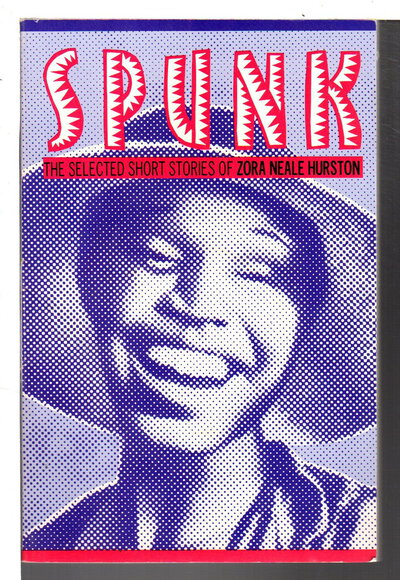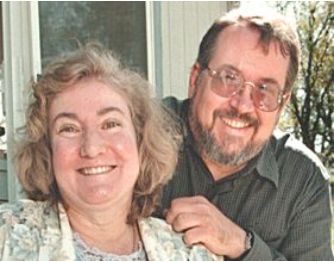Zora Neale Hurston (1891-1960)
Find a selection of Zora Neale Hurston books
ZORA NEALE HURSTON, novelist, folklorist, and leading figure in the Harlem Renaissance, was born in Eatonville, Florida, an all-black community, where her father, a carpenter and Baptist minister, was also the mayor. She attended Howard University from 1918 to 1920, and while there met Alain Locke, one of her mentors, and joined his literary society, Stylus. In 1921, her first short story was published in that society’s magazine. From 1925 to1927 she studied anthropology with Franz Boas, a renowned cultural anthropologist. She did graduate work at Columbia University and went on to do field work for Boas in Harlem, and later traveled through the South collecting African-American folk tales and traditions.
Hurston wrote and published extensively – novels, short stories, plays, folklore, essays – and co-authored a play, “Mule Bone”, with Langston Hughes. Unfortunately, her work was often overlooked by the white literary establishment, and bitterly attacked by leading African American writers such as Richard Wright, who objected to her depictions of rural life and folk lore and who wanted her to write novels of protest. Hurston, however, felt that she was not obligated to be a “Negro writer,” but held forth her right to be only herself. She once said, “At certain times, I have no race, I am me. When I set my hat at a certain angle and saunter down Seventh Avenue, Harlem City, feeling as snooty as the lions in front of the Forty-Second Street Library….”
Zora once remarked, “Mama exhorted her children to ‘jump at de sun.’ We might not land on the sun, but at least we would get off the ground.” Clearly, she followed her mother’s advice. Although she lived during a period of racism, her awards and accomplishments were many: In 1932 she wrote and staged a theatrical revue, The Great Day which was performed on Broadway; In 1934 she established a school of dramatic arts at Bethune-Cookman College; also in 1934, her first novel Jonah’s Gourd Vine was a Book-of-the-Month Club selection.
In 1936 she was awarded a Guggenheim Fellowship to study West Indian Obeah practices in Haiti; in 1943 she was awarded the Anisfield-Wolf Book Award in Race Relations for her autobiography Dust Tracks on a Road. Zora Neale Hurston was known for her strong spirit and her sense of humor. She would sometimes introduce herself as “Zora, Queen of the Niggerati” at Harlem literary events. She once claimed that she got out of a ticket for jaywalking by exclaiming, “I saw all the white folks walking on the green light, so I thought the red light was for me.”
But underneath all of the humor, underlying both her work as a novelist and as a folklorist, was her belief in the beauty of African American culture. It is this which shines through her works, especially in what is probably her greatest novel, Their Eyes Were Watching God.
During the later part of her life, her work fell into obscurity and she herself fell into poverty, working as a librarian and as a maid. She died in a welfare nursing home in Fort Pierce, Florida and was buried in an unmarked pauper’s grave.
Zora Neale Hurston’s works were brought back into publication and her reputation revived in the 1970s, through the efforts of writer Alice Walker. In a personal essay published in Ms. Magazine, Looking for Zora, Walker describes searching through waist-high weeds to find Zora’s unmarked grave. She lay on it a marker inscribed,
Zora Neale Hurston
“A Genius of the South”
Novelist
Folklorist
Anthropologist
1901-1960.
-
 I LOVE MYSELF WHEN I AM LAUGHING.
I LOVE MYSELF WHEN I AM LAUGHING. -
 MODERN AFRICAN AMERICAN WRITERS: Essential Bibliogaphy of American Fiction.
MODERN AFRICAN AMERICAN WRITERS: Essential Bibliogaphy of American Fiction. -
 MOSES MAN OF THE MOUNTAIN.
MOSES MAN OF THE MOUNTAIN. -
 SERAPH ON THE SUWANEE.
SERAPH ON THE SUWANEE. -
 SERAPH ON THE SUWANEE.
SERAPH ON THE SUWANEE. -
 SERAPH ON THE SUWANEE.
SERAPH ON THE SUWANEE. -
 SERAPH ON THE SUWANEE.
SERAPH ON THE SUWANEE. -
 SERAPH ON THE SUWANEE.
SERAPH ON THE SUWANEE. -
 SERAPH ON THE SUWANEE.
SERAPH ON THE SUWANEE. -
 SERAPH ON THE SUWANEE.
SERAPH ON THE SUWANEE. -
 SERAPH ON THE SUWANEE.
SERAPH ON THE SUWANEE. -
 SERAPH ON THE SUWANEE.
SERAPH ON THE SUWANEE. -
 SPUNK, the Selected Short Stories of Zora Neale Hurston.
SPUNK, the Selected Short Stories of Zora Neale Hurston. -
 SPUNK, the Selected Short Stories of Zora Neale Hurston.
SPUNK, the Selected Short Stories of Zora Neale Hurston. -
 SPUNK, the Selected Short Stories of Zora Neale Hurston.
SPUNK, the Selected Short Stories of Zora Neale Hurston. -
 SPUNK: Three Tales by Zora Neale Hurston
SPUNK: Three Tales by Zora Neale Hurston -
 THE COMPLETE STORIES.
THE COMPLETE STORIES. -
![ZORA NEALE HURSTON. by [Hurston, Zora Neale] Witcover, Paul.](https://images.bookfever.com/production/11/71783---width_400.jpg?v=1517895147) ZORA NEALE HURSTON.
ZORA NEALE HURSTON.

